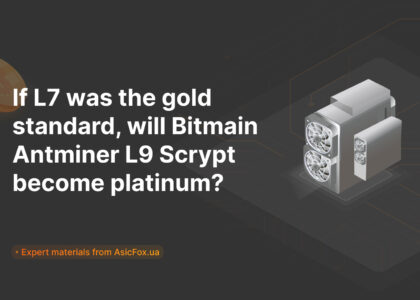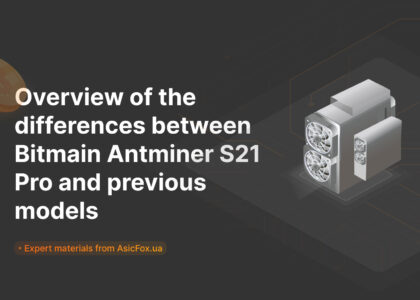Back in 2017, the importance of blockchain technology was overestimated. Many believed that blockchain would change our planet, revolutionize all industries, and bring millions to investors in obscure ICOs. This hype around digital assets helped people to believe in the incredible possibilities of blockchain technology. Today, most people have a misconception of the potential that this technology has. In fact, the blockchain is a simple database structure with specific functions. It allows most parties to record information and share it in real time. What is noteworthy is that participants do not need to trust each other, but are motivated to fulfill their duties honestly by tokens/currency. These are extremely specific properties for a database, as they are only really useful in certain circumstances. For example, they are perfect for the digital currency Bitcoin, because the BTC blockchain allows people to make transactions around the world inexpensively, bypassing banks and all other intermediaries. And yet, blockchains are not suitable for storing absolutely all information. In this article, we’ll explore 10 myths about blockchain and its use.
- Bitcoin is neither the biggest fraud in history nor rat poison. Bitcoin is alive.
Back in 2017, there were several influential people who spoke out against Bitcoin, including Buffett, Munger, and Daimon. Bitcoin blockchain technology has its drawbacks. The consensual mechanism of proof of work consumes a huge amount of electricity, and most users use the system for illegal purposes. However, it is at least unreasonable to assume that blockchain will fail because it has such drawbacks. Bitcoin has been around for about 10 years, even though many people predicted its demise. Mr. Ravikant said: “Bitcoin is the tool that liberates people from tyrants, oligarchs hiding in the guise of a scheme to make a quick buck.” People say that Bitcoin is a fraud, and people who do not understand its capabilities at all delve into the shortcomings of the technology.
- Bitcoin is not a way to increase the price of a company’s shares.
The most prominent examples of companies that have added the word “blockchain” to their names are Long Island Tea, On-line Plc, and Kodak. By the way, they also immediately increased the value of their shares, even though they hadn’t even thought about the blockchain itself.
- Blockchain is not a pyramid scheme.
That is, unless you’re thinking of participating in a project called PonziCoin, which is actually a pyramid scheme.
- Digital currency is not just for scammers.
In fact, history knows a large number of cases of digital asset hacks as well as related scams that have been officially documented. This is considered a key problem with digital currencies. Due to the fact that blockchain technology is anonymous, it can be targeted by hackers or fraudsters. However, this is only an unfavorable side effect of this technology, and definitely not its basis. A terrorist organization called ISIS, which is banned in the Russian Federation, uses social media to recruit new members. But this does not mean that Twitter or Facebook are to blame. Mr. Escobar had so many US dollars that he simply threw them into the fire to keep his own child warm. Absolutely all drug trafficking is based on cash. But that doesn’t make money bad, does it?
- Blockchain technology will not be able to help your non-blockchain startup make money.
If you have seen that some little-known company has conducted an ICO and managed to raise a cosmic amount of money solely on one idea, it does not mean that you should follow suit. ICOs help to ensure a fair distribution of tokens among future users. This motivates them to use the blockchain. These tokens must have some use. If your startup is not related to blockchain technology in any way, you will not need tokens.
- Blockchain cannot revolutionize business.
It is not worth storing information on the blockchain if the business does not need to take into account its advantages.
- Blockchain will not revolutionize every global industry.
There is even a saying: “It’s like Uber for (name of an industry)”. This is how they started talking about blockchain as companies are trying to create an Uber on the blockchain. However, there is one problem with this: not all industries need blockchain. Let’s say you’re not crazy about Uber and you don’t use Lyft, but you solve your problems with blockchain. Of course, a decentralized peer-to-peer network for ride-sharing is quite good. However, then you don’t see all the reasons that make blockchain the most wrong option for organizing ridesharing. The essence of a public blockchain is that it cannot be managed by any central authority. What should be done in this case? And how to resolve disputes that arise? As soon as all the information is uploaded and verified, it is scattered throughout the network. Did you pay for a trip you didn’t take? Did the driver behave impudently and you want to report it? Unfortunately, no one will even listen to you. How do you proceed with the development? How can a distributed firm with no governing body compete with startups that have the largest investors in an already established market? Even if a decentralized Uber were able to overcome all the difficulties and create a working service, would it be much better than a regular Uber? As of today, Uber and other centralized ride-sharing apps are doing their job perfectly. And this alternative is not much better. The possible benefits of blockchain adoption in most existing industries are not enough to make users change their attitudes and behavior.
- Blockchain is not a way to sacrifice to Cthulhu.
The less you know about it, the better it will be.
- Blockchain cannot be considered a platform for memes.
The most popular meme currency is Dogecoin. In 2013, it was jokingly created as a result of a Bitcoin fork, and in 2017, its capitalization amounted to $2 billion.
- Blockchain is useful!
Blockchain can indeed be useful, as long as its token carries at least some benefit. What to expect next? Today you have learned about the most misleading uses of blockchain, but there are also optimal conditions for its use. Blockchain is necessary when the following conditions are met:
- a common database with the ability to add new data;
- a large number of users who have access to record information in this database;
- lack of trust;
- consensus and verification;
- the need to eliminate all intermediaries.
You may be surprised, but money is a perfect fit for all of these conditions. And Bitcoin absolutely meets these criteria. This is an amazing use of blockchain technology. It’s a shame, of course, that as of 2018, there are few effective blockchain applications that are in wide demand. But this does not mean that they will not arise. Perhaps they just haven’t been found yet. This is what you should have understood from our article: blockchain is not a useless technology, nor will it save your business, the global economy, or humanity as a whole. It is necessary to realize the real potential of this technology and shift your focus to what it can actually offer.







Feedback (0)
Leave a review